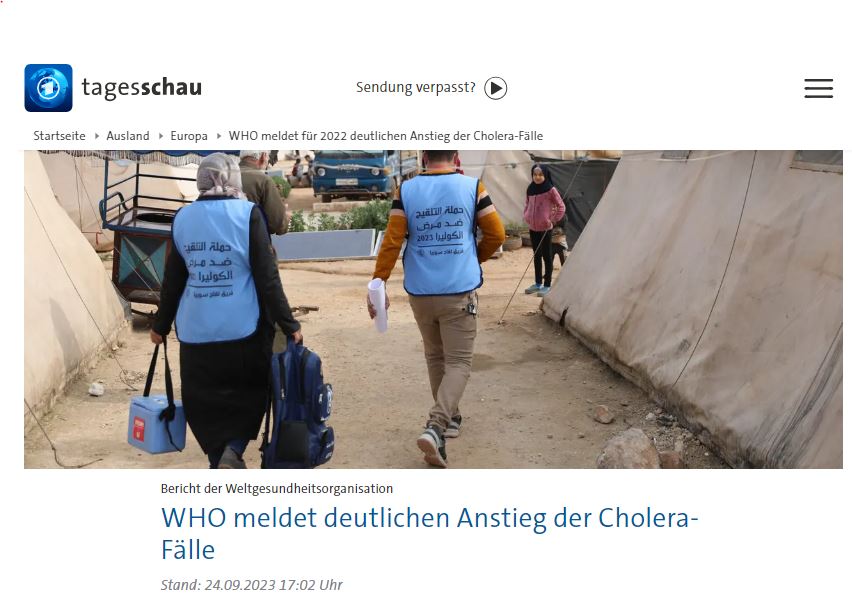In an article entitled “WHO reports significant increase in cholera cases”, published on 24 September 2023 by Tagesschau, a significant increase in cholera cases is reported. This claim turns out to be true.
 Tagesschau claims: “WHO reports significant increase in cholera cases”
Tagesschau claims: “WHO reports significant increase in cholera cases”Twice as many cholera cases as in 2021
The article highlights the increase in cholera cases from 2021 and 2022 and states that the WHO is pointing to a further increase in cholera cases in 2023. Tagesschau is one of the most respected and long-running news programmes on German television, produced and broadcast by ARD (Association of Public Broadcasters in Germany). The programme serves as an important source of information on current events, political developments, the economy, culture, sport and other relevant topics, and enjoys the trust of many people in Germany.
Tagesschau has linked its secondary source, which is the Weekly epidemiological record published by the WHO on 22 September 2023, in the article. The World Health Organization (WHO) is a specialised agency of the United Nations that
focuses on international health issues. It was founded on 7 April 1948 and is headquartered in Geneva, Switzerland. The WHO is responsible for promoting and coordinating international efforts to achieve a high standard of health worldwide. The organization works closely with governments, non-governmental organizations, scientists and other partners to monitor global health, manage crises, develop health programmes and improve access to essential health services.
The Weekly epidemiological record highlighted the significant increase in cholera cases worldwide. The number of reported cases rose to 472,697, which represents a doubling compared to the previous year. During our research, Prof. Dr Thomas Schneider, Head of Infectiology at Charité Universitätsmedizin Berlin, also confirmed this development. The spread in a total of 44 countries is particularly striking, which represents an increase of nine countries compared to the previous year. According to the WHO, it was worrying that countries such as Lebanon and the Syrian Arab Republic were suddenly affected by major cholera epidemics in 2022, even though they had not recorded any outbreaks in recent years.
More than 10,000 suspected or confirmed cases in each country
Large outbreaks of cholera were reported in Afghanistan, Cameroon, the Democratic Republic of Congo, Malawi, Nigeria, Somalia and the Syrian Arab Republic. Each country reported more than 10,000 suspected or confirmed cases. The numbers had more than doubled compared to the previous three years.
Cautious forecast for 2023
The Tagesschau article states that cholera cases will increase in 2023. According to Kathryn Alberti, Technical Officer of the Cholera Programme at WHO, there are signs of more reported cases, but predicting precisely is difficult.
Causes of the cholera increase
She and Professor Dr Thomas Schneider stressed: “Cholera transmission is closely linked to the lack of access to clean water and adequate sanitation. This issue can be caused by several factors, including insufficient development, economic troubles, conflicts, migration, and climate change. The magnitude of a cholera epidemic is directly linked to the capacity to react and control the outbreak promptly. The drop in reported cases from certain countries can be explained by a few factors. The lifting of COVID-19 restrictions means less prevention and control measures, which worsens cholera spread. To tackle cholera, Prof. Dr
Thomas Schneider and Kathryn Alberti call for long-term solutions like better water quality, hygiene and sanitation. Inadequate vaccine availability also causes a rise.
Conclusion
The claim “WHO reports significant increase in cholera cases” in the article of Tagesschau is substantiated and proven to be true. The increase in cholera cases was recorded in the WHO’s weekly epidemiological report published on 22 September. The number of cases reached 472,697, a doubling compared to last year. This claim’s correctness is further supported by expert confirmation from Prof Dr Thomas Schneider. The article highlights the complexity of the factors contributing to the increase in cholera and the importance of long-term solutions in the areas of water quality, hygiene, sanitation and vaccine availability.
We would like to take this opportunity to point out that research on this topic has become challenging. Read more about this in our blog post titled “Navigating Press Freedom Challenges in Overwhelmed Health Systems”.
RESEARCH | ARTICLE © Sonja Gretkowski and Nora Lohner Jade University of Applied Sciences, Germany
Leave our comments, thoughts, and suggestions in the box below. Take note: your response is moderated.

 2 months ago
32
2 months ago
32


